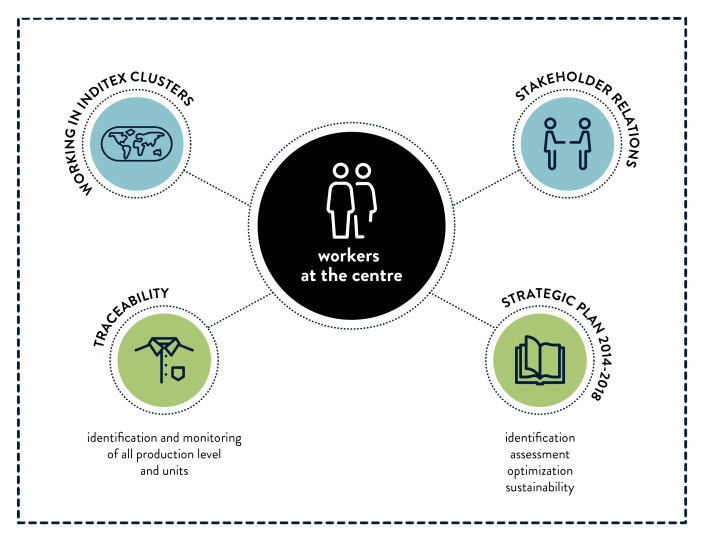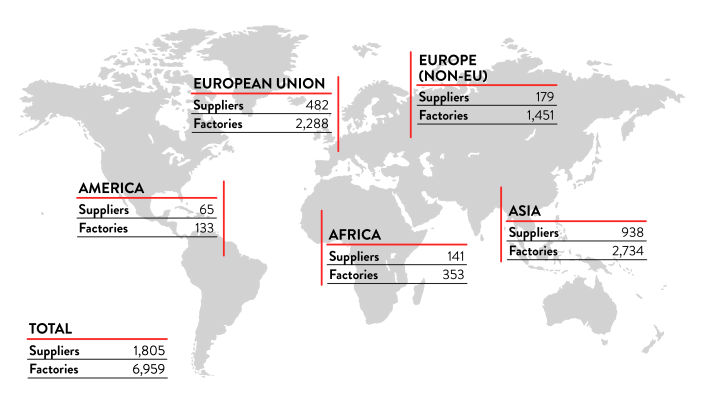SUSTAINABLE MANAGEMENT OF THE SUPPLY CHAIN
Our strategy for supply chain sustainability aims to create sustainable production environments in which the Human and Labour Rights of the workers of our suppliers are promoted and respected.
Our work in the supply chain seeks to create a sustainable production environment in the countries where we operate, one that stands for the promotion and respect of human rights, as established by the UN Guiding Principles on Business and Human Rights. Thus, at Inditex, we work to contribute to the Sustainable Development Agenda, especially in those Development Goals (SDGs) that most affect our supply chain, such as the protection of good health and well-being (SDG 3), the achievement of gender equality and the empowerment of all women and girls (SDG 5), the promotion of decent work and economic growth (SDG 8), or the establishment of partnerships for the Goals (SDG 17).
Production traceability is essential in ensuring that our programmes reach all phases and processes of the supply chain. In 2016, the Inditex Group worked with 1,805 suppliers in 53 countries; these suppliers used 6,959 factories for our production. Each of these countries has different social, cultural, and developmental circumstances. And although Inditex's ability to influence them is, in most cases, very limited, our involvement in contributing positively is absolute.
The Code of Conduct for Manufacturers and Suppliers, and the Compliance Programme that ensures its implementation, are the cornerstone on which all programmes are based. Throughout its execution we have developed our Strategic Plan for a Stable and Sustainable Supply Chain 2014-2018, which in 2016 has passed its mid-way point with a high level of compliance.
Our programmes share a fundamental premise: they are by and for the worker, who is at the centre of everything we do. We have designed programmes in areas such as health and safety, women empowerment or living wages, among others, inspired by our proximity to suppliers and factories through supplier clusters. The clusters offer spaces for cooperation and are designed to promote a sustainable and productive environment in geographic areas that are strategic to the development of Inditex’s business model. We currently have twelve supplier clusters: Spain, Portugal, Morocco, Turkey, India, Bangladesh, Vietnam, China, Cambodia, Brazil, Argentina and, since 2016, Pakistan.
We firmly believe in the need for networks and cooperation for creating greater positive impact and, above all, sustaining it over time. We would highlight our collaboration since 2007 with the International Federation of Trade Unions “IndustriALL Global Union”, through a Global Framework Agreement which in 2017 will have been in force for ten years. We also collaborate with other organizations and initiatives, such as the International Labour Organization (ILO), the UN Global Compact or the Ethical Trading Initiative (ETI), among others.
| INDITEX AND THE SUSTAINABLE DEVELOPMENT GOALS | INDITEX’S CONTRIBUTION | |
|
|
Goal 3: Ensure healthy lives and promote well-being for all at all ages. | The commitment to ensure safe and healthy work environments to promote the health and well-being of workers is key to Inditex's supply chain management. This commitment can be seen in our Code of Conduct and its compliance is evaluated by different audits. Moreover, we develop specific programmes to ensure health and safety in factories. |
|
|
Goal 5: Achieve gender equality and the empowerment of all women and girls. | Gender equality and women’s empowerment are particularly important in a sector such as textiles, as workers in the supply chain are mostly female. Inditex not only verifies that all the workers in the factories with which it collaborates have the same opportunities and working conditions regardless of gender, but that the factories also conduct programmes for women’s empowerment. |
|
|
Goal 8: PPromote sustained, inclusive and sustainable economic growth, full and productive employment and decent work for all. | Inditex’s supply chain comprises over 6,900 factories which employ over 1.5 million people. Inditex’s positive impact on promoting decent work for them is highly relevant. On the one hand, Inditex has a Code of Conduct for Manufacturers and Suppliers that is binding for its entire supply chain, which establishes standards such as the prohibition of child labour, prohibition of forced labour or freedom of association, among others. On the other hand, all the programmes and projects are developed by and for the workers. |
|
|
Goal 17: Strengthen the means of implementation and revitalize the Global Partnership for Sustainable Development | Cooperation with each and every player of the supply chain is the cornerstone of Inditex’s sustainability strategy. In this sense, we collaborate and maintain strategic alliances not only with our suppliers and manufacturers, but also with stakeholders such as unions, governments, NGOs and relevant international platforms such as the International Labour Organization (ILO), the United Nations Global Compact and the Ethical Trading Initiative, among others. |
PROMOTION AND RESPECT FOR HUMAN RIGHTS

Number of suppliers and Factories in 2016 (*)

PRODUCTION in proximity
Production is mainly concentrated in countries such as Spain, Portugal, Morocco and Turkey. The number of factories does not represent the actual percentage of production.
(*) Suppliers of fashion items, mainly clothing, footwear and accessories, producing over 20,000 units/year for Inditex. Suppliers with smaller production account for 0.29% of the total production.
Textile, footwear and accessory factories declared by suppliers in the manufacturer management system for orders in 2016.